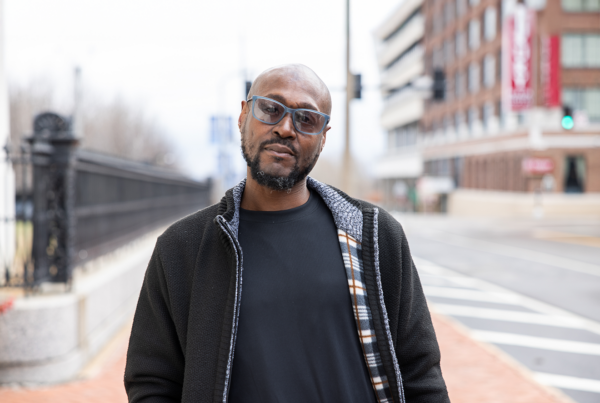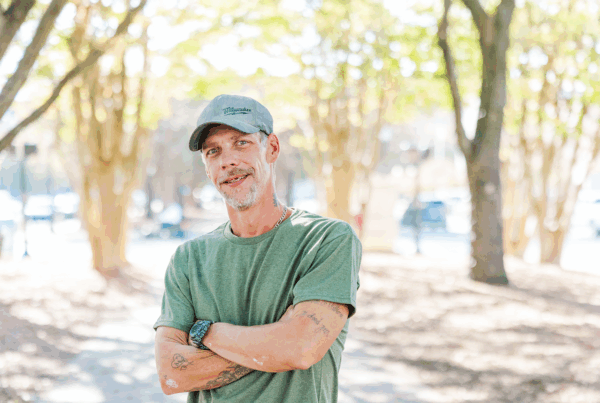For one week, Tyron McAlpin, a deaf Black man with cerebral palsy, waited alone, inside a small medical isolation cell at a Maricopa County jail, wondering when he would be able to meet with his attorney. He sat up, laid down, and paced around the locked room, completely unaware that correctional officers were not informing him of his lawyer’s repeated attempts to visit and The Bail Project’s efforts to provide him with free bail assistance to release him.
It was early September 2024, nearly 24 days after he’d been punched, pummeled, and tased by two Phoenix police officers after walking out of a convenience store, then arrested and accused of not obeying officers’ verbal commands and assault – the latter charge stemming, according to his lawyers, from a hand injury one of the officers sustained as a result of “having beaten him too hard.” Afterward, Tyron was taken to Lower Buckeye Jail, where he was charged with two felonies and a misdemeanor, and his bail was set at $6,500, which he could not afford. By the time prosecutors decided to drop all charges against Tyron two months later, he was still struggling to overcome the physical and psychological effects of what had taken place – both on the day of his arrest and in the subsequent weeks that followed.
Tyron is a 34-year-old father to a five-year-old with no previous criminal history. “He’s a very sweet man who really likes people and is a very helpful person,” one of Tyron’s attorney’s said recently. His case comes on the heels of a United States Department of Justice investigation, released in June, which revealed that the Phoenix Police Department routinely discriminates and uses excessive force against Black and other minority groups; and, separate news reports, released in August, which found that the Maricopa County jails have a in-custody mortality rate that is more than four times higher than the national average.
“Phoenix officers have been trained to use significant force to overwhelm American citizens as a means of ‘preventing resistance’ before any resistance actually exists.”
“We believe that this is consistent with Phoenix’s history of training officers to ‘escalate,’” Tyron’s attorney told reporters. “Phoenix officers have been trained to use significant force to overwhelm American citizens as a means of ‘preventing resistance’ before any resistance actually exists. We believe that this case highlights a culture within the Phoenix Police Department that ignores the Constitutional rights of American citizens like Tyron.”
Early in the morning on August 19, Tyron was walking home after leaving the convenience store when he was wrongfully identified as being involved in an altercation. Body-camera footage from that day shows Phoenix police officers pulling into a parking lot, where Tyron is walking. The officers call out to him from their car window, asking him to stop. But because Tyron is deaf, he was unable to hear their request.
Within seconds after jumping out from the car, the officers begin punching Tyron. As they continued to strike Tyron in the head and tase him, he collapsed onto his stomach, his hands folded at his side, screaming – still unaware why police had stopped him in the first place.
“I had an investigator…interview employees who were on shift that morning and they all said they know Tyron,” his lawyer told reporters, adding: “He was there [at the convenience store] that morning and opening the door for people. He comes in frequently there and he comes in and buys a drink for his girlfriend. He’s an innocent man.”
At the jail, Tyron was booked and treated for a concussion. At his bail hearing, the next day, police did not mention his disabilities in materials provided to the court. Unable to afford the $6,500 bail amount set by the judge as a condition for his release, Tyron was escorted back to jail. Because staff at the correctional facility did not understand American Sign Language (ASL), they locked him inside a single cell unit in the medical ward, where, kept alone, Tyron was unable to gain access to his lawyer or speak with family. During that time, he wasn’t informed that he was receiving visitors nor was he able to coordinate his defense because of the communication barrier.
Tyron’s experience illustrates how cash bail greases the wheels of a broken criminal justice system and shows how people with disabilities who are incarcerated face great obstacles to ensuring that their protected legal rights are not violated. In jails across the country, people with disabilities are routinely held in isolation or solitary confinement. These buildings or medical units are often located in inaccessible areas of correctional facilities, which makes getting in touch with lawyers or others outside of jail extremely difficult – both for the incarcerated individual, as well as those seeking to speak or visit with them. As a result, people with disabilities face great risk of being held in jail indefinitely while waiting for trial.
“People who are locked in these areas of the jail don’t have any access to phones or monitors to make outside calls,” Boellis Skidmore, a Phoenix-based Bail Project staff member, said.
Tyron was especially vulnerable at the jail for a number of reasons. For most of the 24 days that he was incarcerated, he had no idea what was going on. When aides and services, like video phones and sign language interpreters, are not readily available for people who are deaf or hard of hearing, it can render communication mostly or entirely inaccessible. And when such assistance for legally innocent people, such as Tyron, is out of reach, they are less likely to reach a positive outcome in their case, compared with people who are released pending trial.
The lack of services available to assist Tyron’s communication was also especially dangerous to his health and well-being, given he has cerebral palsy. It was important that he be able to communicate with staff in a timely manner about his medical needs. But because of the communication barrier, Tyron’s ability to communicate was ripped from him and made nearly impossible.
The Bail Project learned about Tyron’s case in early September, after his public defender reached out to our Phoenix team. But by then he had already spent nearly three weeks in jail – and most of that time locked alone in isolation. After learning about his situation, The Bail Project, with the help of Tyron’s attorney and partner, immediately began working to secure his release. But because of the lack of accessibility services at the jail, and the fact that Tyron was being kept in isolation, The Bail Project and Tyron’s public defender encountered issues in scheduling a meeting with him, which prolonged the already unnecessary time he was being kept behind bars.
One week after learning about Tyron, Boellis, the Bail Project staff member in Phoenix, paid Tyron’s bail and he was released from jail. Afterwards, Boellis continued to support Tyron by providing court reminders and transportation assistance, as well as referrals to private attorneys for a possible civil case against the city. One month later, all of Tyron’s charges were dismissed. But even after receiving free bail assistance, Tyron still spent nearly one month in jail for a crime he never committed, all because he was unable to afford bail.
“I think the larger problem that this points to is that in the city of Phoenix, officers are able to do this without any accountability.”
Tyron has recently learned that the officers responsible for arresting him have been placed on paid administrative leave while an internal investigation into their conduct continues. “I think the larger problem that this points to is that in the city of Phoenix, officers are able to do this without any accountability. They’re able to do it with impunity,” Tyron’s lawyer said to reporters. When announcing the internal investigation, the Chief of the Phoenix Police Department said in a statement: “There are many who are concerned after seeing the video of officers’ interaction with a man they later learned was disabled. I recognize the video is disturbing and raises a lot of questions. I want to assure the community we will get answers to those questions.”
Tyron is currently being represented by lawyers in a potential civil rights lawsuit against the city of Phoenix. His case is not a one-off occurrence. Many people with disabilities across the country face excessive force by police and are then funneled into jail systems where they are kept before trial all because they cannot afford cash bail. And more often than not, incarcerated people with disabilities do not have access to services that they are entitled to have by law. Unable to communicate and advocate for themselves, these people are forced to navigate an unsafe environment and face even greater difficulty overcoming the long-lasting impacts of wealth-based detention.
Image: Robbins Curtin Millea & Showalter via Huffington Post
Thank you for reading. The Bail Project is a 501(c)(3) nonprofit organization that is only able to provide direct services and sustain systems change work through donations from people like you. If you found value in this article, please consider supporting our work today.











